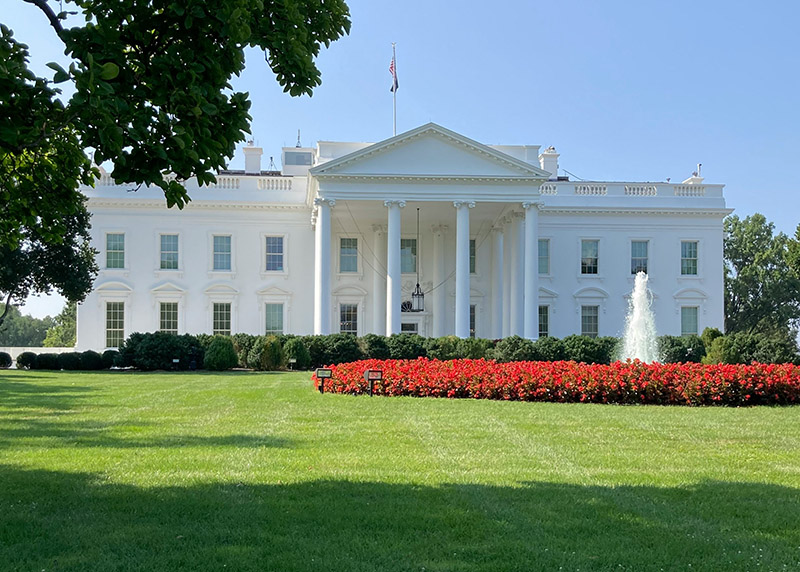Justice Department issues statement of interest in transgender prisoner’s sexual assault lawsuit
DOJ argues prison officials violated Ashley Diamond's rights by housing her in men's prisons and denying her medically necessary care.

Last Thursday, the Department of Justice issues a statement of interest in a Georgia transgender prisoner’s lawsuit against the Georgia Department of Corrections, in which she claims prison officials violated her constitutional rights and failed to protect her from multiple sexual assaults.
Ashley Diamond, a Black transgender woman currently housed at Coastal State Prison in Garden City, Georgia, had previously sued the state’s Department of Corrections in 2015 for violating her Eighth Amendment right to freedom from cruel and unusual punishment as it relates to her medical treatment, which has exacerbated her gender dysphoria and led her to attempt suicide and self-castration multiple times. She also has claimed, repeatedly, that being housed in men’s prisons has placed her at greater risk of sexual assault due to her gender identity.
The Georgia Department of Corrections ultimately settled Diamond’s 2015 lawsuit, agreeing to several stipulations regarding the housing of transgender inmates and access to medical care. Diamond was released fro. prison in 2016, but was later re-incarcerated in 2019 for parole violations. Upon returning to prison, she found that the department had failed to carry out any of the reforms it had agreed to in settling her first lawsuit.
Diamond then sued the department a second time, alleging that the department’s failure to abide by the terms of the settlement, as it pertains to being housed in men’s facilities and being able to access gender-affirming care, violated her constitutional rights.
She also claims to have been assaulted 16 times in custody, in part due to prison officials telling other inmates she was a “snitch” and leaking confidential details about her gender identity and her case, in violation of the Prison Rape Elimination Act.
In its statement, the U.S. Department of Justice says it has an interest in ensuring that the conditions to which inmates are subjected while in the custody of state or federal correctional facilities do not violate their constitutional rights.
The Justice Department also affirms that it has a “strong interest in protecting the rights of lesbian, gay, bisexual, and transgender individuals,” citing provisions of an executive order, issued by President Joe Biden earlier this year, that seeks to prohibit discrimination against members of the LGBTQ community.
The DOJ says that prison officials violate the Eighth Amendment’s prohibition against cruel and unusual punishment when they fail to consider housing transgender inmates in facilities corresponding to their gender identity in cases where they know a prisoner faces a substantial risk of serious harm by remaining in their current conditions, or where they show “deliberate indifference” to that potential risk.
“A prison official acts with deliberate indifference when she or he ‘knows of and disregards an excessive risk to prisoner health or safety; the official must both be aware of facts from which the inference could be drawn that a substantial risk of serious harm exists, and he must also draw the inference,'” the statement of interest reads. “The Supreme Court explained that if a plaintiff demonstrates that prisoners faced a substantial risk of attacks that was ‘longstanding, pervasive, well-documented, or expressly noted to prison officials in the past, and the circumstances suggest that the defendant-official being sued had been exposed to information concerning the risk and thus must have known about it,’ a court could conclude that prison officials had knowledge of the risk.”
See also: Federal court orders Illinois prisons to overhaul how they deal with transgender inmates
The DOJ also argues that prison officials violate the Eighth Amendment when they fail to treat a transgender prisoner’s gender dysphoria based on an individualized assessment of that person’s medical needs, noting that gender dysphoria — as well as attempts at self-mutilation and suicide that can stem from it — are serious medical conditions.
“To establish a violation of the Eighth Amendment’s guarantee of adequate medical treatment, a prisoner must meet two elements. First, she must demonstrate that she has an objectively serious medical need. Second, she must she must show that prison officials exhibited ‘deliberate indifference’ to that need, meaning they knew there was a substantial risk of harm to the plaintiff if that need was not met, yet they disregarded that risk by conduct that amounted to more than mere negligence,” the DOJ writes.
“Although the Eighth Amendment does not entitle prisoners to the medical treatment of their choice, it does require prison officials to provide constitutionally adequate medical treatment for serious medical conditions,” the statement of interest continues. “For this reason, prison officials can violate the Eighth Amendment even when they provide some medical treatment, if that treatment is inadequate as informed by medical professionals and standards of care…. In assessing possible treatment options for gender dysphoria, prison officials must consider an individual prisoner’s medical needs. Blanket bans on categories of treatment are at odds with the Eighth Amendment because they do not account for the individual medical needs of prisoners.”

Diamond’s lawyers, with the Center for Constitutional Rights and the Southern Poverty Law Center, praised the DOJ’s statement of interest for acknowledging the responsibility of prison officials to house transgender inmates and offer individually-tailored gender-affirming care, saying its arguments affirm everything Diamond alleges in her current lawsuit.
“In essence, the DOJ confirms that when it comes to Ms. Diamond — who alleges repeated sexual assaults, including by prison officials, and ongoing denial of adequate medical care — the U.S. Constitution is on her side,” Diamond’s legal team said in a statement. We are encouraged that the Biden administration agrees, and optimistic that the court will protect the rights of Ms. Diamond and other incarcerated trans people.”
According to a 2018 report from the National Center for Transgender Equality, transgender people are 10 times more likely to be sexually assaulted than the general prison population, with 2 in 5 transgender inmates saying they’d been sexually assaulted in the past year.
“It’s really almost without precedent — I say almost, because about five years ago to this date, the Department of Justice weighed in on Ashley Diamond’s first case, which addressed, for the first time in the 11th Circuit, whether denying hormone therapy to inmates on a blanket basis was a violation of the Eighth Amendment,” Chinyere Ezie, a senior staff attorney at the Center for Constitutional Rights, told Metro Weekly in an interview when asked about the significance of the DOJ’s filing.
“So at that time [in 2015], the Department of Justice weighed in and said that it was unconstitutional to deny hormone therapy to people gender dysphoria or to treat it differently than any other medical condition that requires individualized care. But since that time, there hasn’t been a lot of guidance from the Department of Justice about how the Constitution and how the Eighth Amendment should be interpreted when it comes to prisoners,” Ezie said.
See also: U.S. Supreme Court refuses Idaho’s request to postpone transgender inmate’s surgery
Ezie said she believes the DOJ’s statement of interest will also put prison officials across the country, not just in Georgia, on notice that the conditions to which Diamond was subjected are unconstitutional.
“This statement of interest is really historic, because it states with such clarity that prison officials have a duty to protect transgender individuals in custody. That includes placing them in facilities based on their gender identity, where appropriate for safety, and also that they have a duty to provide individualized treatment for treatment and that they can’t erect artificial barriers to care or blanket bans, which unfortunately, is exactly what Ashley Diamond has been experiencing in custody,” Ezie said. “…So not only do I think that this brief will be very persuasive in our case, which is going to a hearing on May 12 on these very issues, I believe it also will be of assistance to every single trans person in custody nationwide who is navigating their own fight for our safety and for health care behind bars.”
GLAAD, the world’s largest LGBTQ media advocacy organization, and #FreeAshleyNow, the grassroots campaign mounted by trans activists and formerly incarcerated people pushing for Diamond’s release from prison, both noted that the DOJ’s statement of interest is significant, in so far as it affirms that Diamond’s rights have been violated while in custody.
“While we don’t rely on the DOJ as our moral compass, they are affirming what Ashley, her legal team, and her advocates have been saying all along,” K. Agbebiyi of the #FreeAshleyNow Campaign said in a statement. “Her being caged anywhere is a violation of her rights, let alone inside a men’s prison even though she is a woman. Ashley deserves safety, access to gender affirming hormones, and healing, but most importantly she needs to be free.”
“No one should be subjected to traumatizing harassment and sexual assault in any environment, but that is exactly the extra price incarcerated trans women so often pay,” Mary Emily O’Hara, GLAAD’s rapid response manager, said in a statement. “The constant advocacy of Ashley’s team helped increase visibility and media coverage of her case, and this week the Justice Department confirmed what we already know: housing trans women in men’s prisons is an urgent human rights violation that needs to stop.”
Read more:
Alabama governor signs anti-transgender athlete bill into law
UK government disbands LGBT advisory panel after members quit in protest
Biden administration reverses Trump’s ban on embassies flying Pride flags
Support Metro Weekly’s Journalism
These are challenging times for news organizations. And yet it’s crucial we stay active and provide vital resources and information to both our local readers and the world. So won’t you please take a moment and consider supporting Metro Weekly with a membership? For as little as $5 a month, you can help ensure Metro Weekly magazine and MetroWeekly.com remain free, viable resources as we provide the best, most diverse, culturally-resonant LGBTQ coverage in both the D.C. region and around the world. Memberships come with exclusive perks and discounts, your own personal digital delivery of each week’s magazine (and an archive), access to our Member's Lounge when it launches this fall, and exclusive members-only items like Metro Weekly Membership Mugs and Tote Bags! Check out all our membership levels here and please join us today!


























You must be logged in to post a comment.